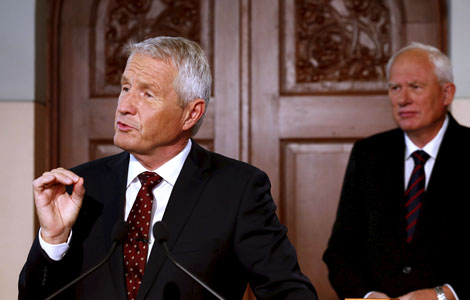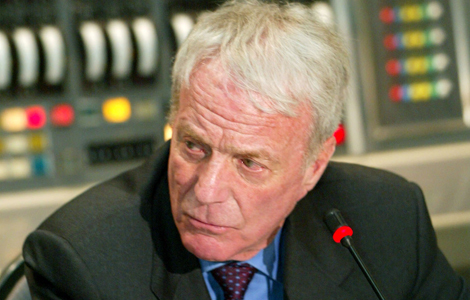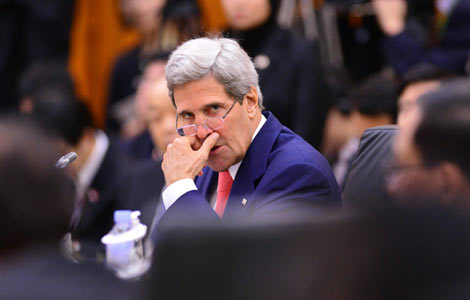Analysts say Yellen will focus on domestic economy
Updated: 2013-10-11 10:13
By Amy He in New York (China Daily)
|
||||||||
Janet Yellen becoming head of the United States Federal Reserve might not have a big, immediate impact on foreign markets because her primary focus will be on the US’ domestic economy, experts say.
How Yellen’s monetary policies will affect the emerging market economies in the immediate future is less of a focus, Martin Feldstein, professor of economics at Harvard University, said on a conference call held on Thursday by the Council of Foreign Relations.
“I think — but I may be putting words in her mouth that she didn’t actually say — but I think Janet has said recently that the Fed has to focus on the US economy, and that their mandate is not to worry about what it means for Brazil, or what it means for India,” Feldstein said. “Those countries have to take whatever offsetting — either regulatory or macro-monetary — policy is necessary.”
It’s difficult enough, Feldstein said, to consider monetary policy in accordance to the many dimensions of the US economy, but “if we start thinking about what it means for the rest of the world, it becomes a hopelessly complicated problem.”
President Barack Obama on Wednesday announced Yellen’s nomination to succeed Ben Bernanke as head of the Fed. She is now vice-chairwoman, and if confirmed by the Senate for a four-year term as is expected, the 67-year-old Yellen would become the first woman to lead the 100-year-old central bank.
Sebastian Mallaby, director of the Maurice R. Greenberg Center for Geoeconomic Studies who moderated the call, asked whether Feldstein or Adam Posen, president of the Peterson Institute for International Economics who also was on the call, felt that Yellen would have to think more internationally than her predecessors did.
Posen said that given how much the US imports, and “given the need for stability in the US, stabilizing nominal growth in the US is of net benefit to the world, irrespective of the spillovers.”
The health of emerging markets has historically been closely tied to how the US economy performs, he said. “We always have the expression, ‘The US sneezes, Latin America catches a cold,’ and that remains true,” Posen said. “There was this delusion on the part of, say, India and Brazil: because they were politically big enough to be in the G20, they would have more independence. But it’s just the reality of the world that they are integrated with the US economy.”
In the long term, Feldstein said that as long as the Fed can “deliver a low-inflation environment,” he thinks “Chinese investors will be happy.”
On the US economy, Posen and Feldstein discussed what the Fed may encounter under Yellen. “They have it strengthening later this year, strengthening more next year,” Feldstein said. “That’ll be very nice, but it wouldn’t surprise me if they’re being too optimistic about it.”
Congress has so far failed to strike a deal to raise the US government’s $16.7 trillion borrowing limit, which is set to expire on October 17, and Feldstein said “if the debt ceiling actually binds, we could see a significant downturn in the economy in 2014, and there really isn’t much that the Fed would be able to do about any of those things. I think it’s already very limited in the effectiveness of its policies, so any significant slowdown or downturn I think will find them in a very frustrated position.”
The fiscal impasse in Washington also came up in a meeting of US Secretary of State John Kerry and China’s Premier Li Keqiang, according to Reuters. Kerry told Li that the US was committed to resolving the situation after the Chinese leader raised the issue in a meeting on the sidelines of an Asian summit in Brunei, a senior State Department official said on Thursday, according to Reuters.
The official, speaking on condition of anonymity, said Kerry made clear that the US government shutdown and friction over the US budget “is a moment in Washington politics’’ and reaffirmed the President Barack Obama’s commitment to resolving the issue. China, which holds the most US debt —$1.28 trillion according to the US Treasury — has raised concerns over a drawn-out crisis in Washington.
Contact the writer at amyhe@chinadailyusa.com

 Chemical weapon watchdog wins Nobel
Chemical weapon watchdog wins Nobel Cruise trip adds leisure to travel
Cruise trip adds leisure to travel
 What does paradise smell like?
What does paradise smell like?
 Second American in orbit dies at 88
Second American in orbit dies at 88
 Shaolin kung fu dazzles the UN
Shaolin kung fu dazzles the UN
 Giant Duck falls flat in Beijing
Giant Duck falls flat in Beijing
 World's 1st curved smartphone hits S Korean stores
World's 1st curved smartphone hits S Korean stores
 Fiscal deadlock will be resolved, Kerry tells Li
Fiscal deadlock will be resolved, Kerry tells Li
Most Viewed
Editor's Picks

|

|

|

|

|

|
Today's Top News
Obama, Republicans struggle to break fiscal deadlock
Schedule for Golden Week raises eyebrows
Yellen will focus on domestic economy
Opportunity knocks for US businesses
KFC needs new faces, not new ad campaign
China's growth rate to exceed 7.5%
US woos Malaysia in TPP talks
Nobel literature winner's work snubbed in China
US Weekly

|

|







